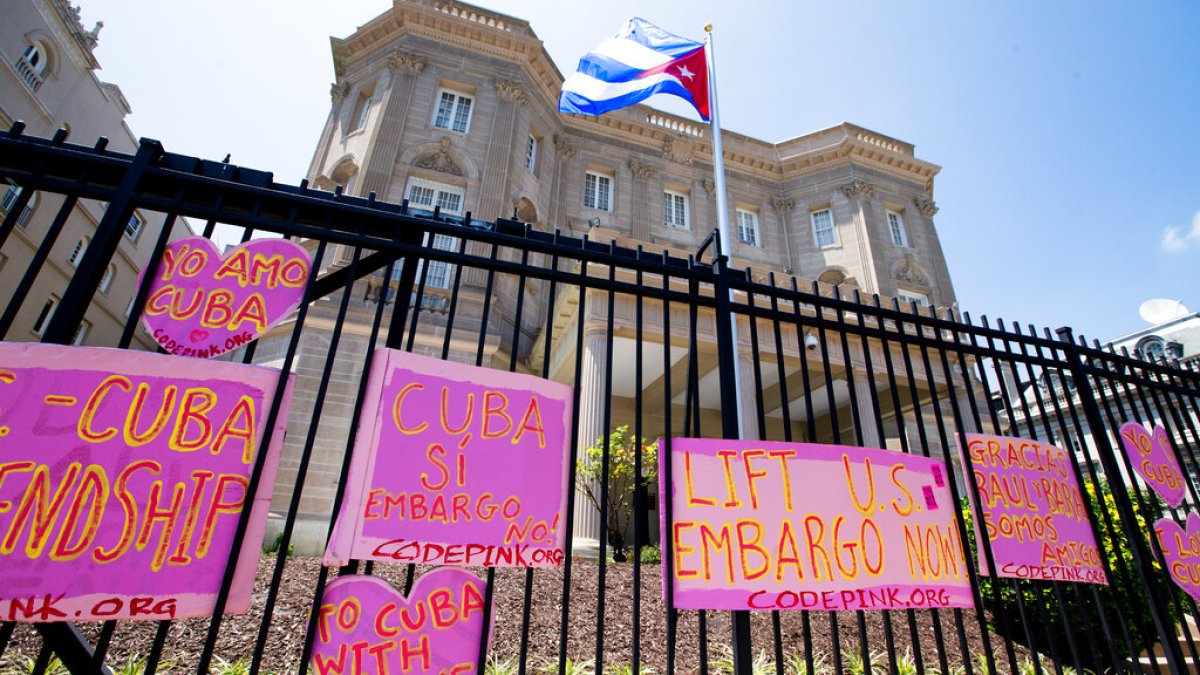Two Molotov cocktails were thrown at the embassy in the second attack since shots were fired at the diplomatic compound in 2020.
An assailant attacked the Cuban Embassy in the United States capital of Washington, DC with two Molotov cocktails, Cuban Foreign Minister Bruno Rodriguez Parrilla said on social media, adding that nobody was hurt.
The attack occurred on Sunday night just hours after Cuba’s leader Miguel Diaz-Canel returned to the island, having attended events at the United Nations in New York last week.
No one took responsibility for the attack, which caused no significant damage or casualties, according to Cuban officials, although Havana quickly pinned blame on Cuban exiles in the US.
“Anti-Cuban groups turn to terrorism when they feel impunity, something Cuba has repeatedly warned US authorities about,” Rodriguez said on X, formerly known as Twitter.
En la noche de hoy, 24/9, la Embajada de #Cuba en EEUU fue objeto de un ataque terrorista de un individuo que lanzó 2 cocteles molotov. No hubo daños al personal. Se están precisando los detalles.
Es el segundo ataque violento contra la sede diplomática en Washington,
— Bruno Rodríguez P (@BrunoRguezP) September 25, 2023
[Unofficial translation: “Tonight, 9/24, the #Cuba Embassy in the US was the target of a terrorist attack by an individual who threw 2 Molotov cocktails. There were no injuries to personnel. The details are being worked out. It is the second violent attack against the diplomatic headquarters in Washington.”]
Cuba’s President Diaz-Canel denounced that attack and said he was awaiting “action from the North American authorities”.
“Hatred once again last night caused a terrorist attack against our embassy in Washington, an act of violence and weakness that could have cost precious lives,” he wrote on X.
El odio lanzó anoche, otra vez, un ataque terrorista contra nuestra Embajada en #Washington, en un acto de violencia y de impotencia que pudo costar valiosas vidas.
Lo denunciamos y esperamos acción de las autoridades norteamericanas.#Cuba ????????
— Miguel Díaz-Canel Bermúdez (@DiazCanelB) September 25, 2023
The Cuban leader’s appearance last week at the UN was met with demonstrations by opponents of the Communist government in Havana founded by Fidel Castro.
White House National Security Adviser Jake Sullivan said on Monday that the US strongly condemned the reported attack.
“We are in contact with Cuban embassy officials and law enforcement authorities to ensure an appropriate and timely investigation as well as to offer our support for future protective efforts,” he said in a statement.
US State Department spokesman Matthew Miller told reporters that his department was coordinating with Washington, DC police in the investigation.
A US Secret Service spokesperson was cited by NBC News as saying that no arrests had been made and there was no fire or significant damage to the building.
While Washington, DC frequently sees protests outside foreign embassies, attacks are rare and the US routinely denounces incidents that affect its missions overseas.
The throwing of Molotov cocktails was the second violent attack against the Cuban embassy in Washington, DC, Cuba’s foreign minister said.
Rodriguez said shots had been fired at the building from a rifle in 2020. That shooting left bullet holes in exterior walls and columns, broke a street lamp and damaged several panes of glass and mouldings on the front of the building.
US authorities arrested Alexander Alazo over the shooting, charging him with multiple offences, according to the US Justice Department.
The Cuban Embassy reopened as a full mission in 2015 when the countries restored diplomatic ties severed since 1961.
The re-opening came amid a reconciliation bid by former US President Barack Obama, who believed that decades of US efforts to isolate the island had failed.
His successor, Donald Trump, backed by staunchly anti-communist Latino voters in the politically vital state of Florida, reversed most of Obama’s overtures.
President Joe Biden has mostly kept in place Trump’s policy of pressure and imposed sanctions after Cuba was rocked by unusual mass protests in July 2021.

